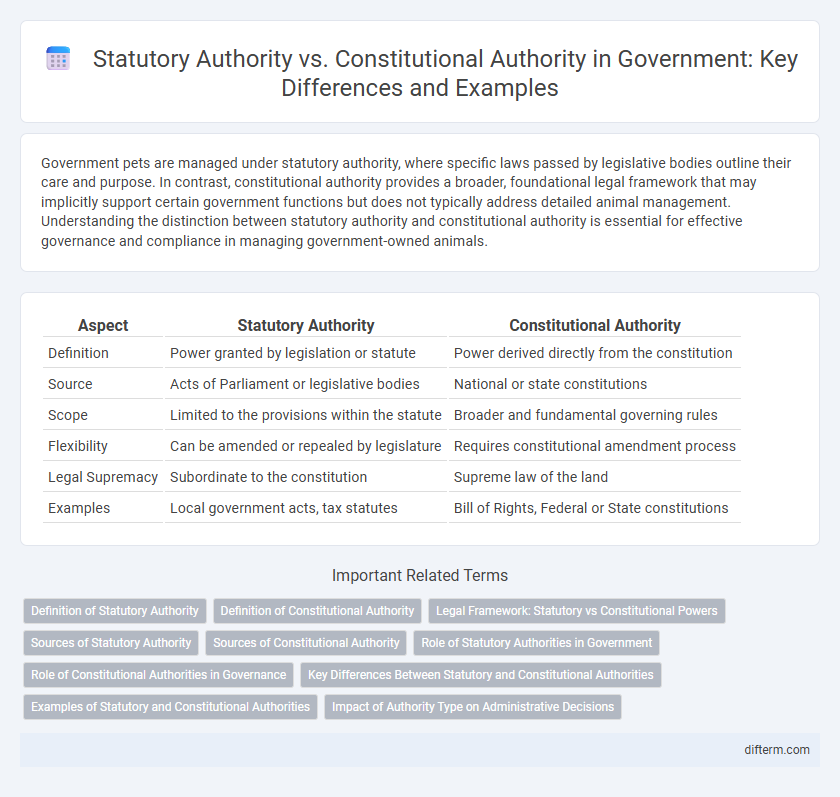Government pets are managed under statutory authority, where specific laws passed by legislative bodies outline their care and purpose. In contrast, constitutional authority provides a broader, foundational legal framework that may implicitly support certain government functions but does not typically address detailed animal management. Understanding the distinction between statutory authority and constitutional authority is essential for effective governance and compliance in managing government-owned animals.
Table of Comparison
| Aspect | Statutory Authority | Constitutional Authority |
|---|---|---|
| Definition | Power granted by legislation or statute | Power derived directly from the constitution |
| Source | Acts of Parliament or legislative bodies | National or state constitutions |
| Scope | Limited to the provisions within the statute | Broader and fundamental governing rules |
| Flexibility | Can be amended or repealed by legislature | Requires constitutional amendment process |
| Legal Supremacy | Subordinate to the constitution | Supreme law of the land |
| Examples | Local government acts, tax statutes | Bill of Rights, Federal or State constitutions |
Definition of Statutory Authority
Statutory authority refers to power granted to government agencies or officials through legislation enacted by a legislative body, enabling them to create regulations or enforce laws within a specific scope. This form of authority operates under statutes passed by Parliament or Congress, differing from constitutional authority, which is derived directly from the constitution as the supreme law. Understanding statutory authority is crucial for delineating the limits and responsibilities of government entities in administrative law and governance.
Definition of Constitutional Authority
Constitutional authority refers to the power granted to government institutions and officials explicitly by a constitution, forming the fundamental legal framework that governs their actions. This authority is derived from the supreme law of the land and sets the limits and scope of governmental powers, ensuring that all statutes and regulations comply with constitutional mandates. It contrasts with statutory authority, which originates from laws passed by legislative bodies within the bounds established by the constitution.
Legal Framework: Statutory vs Constitutional Powers
Statutory authority is derived from legislation enacted by a governmental body, defining specific powers and functions within the legal framework, while constitutional authority originates from the supreme law of the land, establishing foundational powers and limits of government entities. Statutory powers can be modified or repealed by legislative action, whereas constitutional powers require formal amendments to the constitution, reflecting a higher level of legal rigidity. The interplay between statutory and constitutional authority shapes the scope and exercise of governmental powers, ensuring both flexibility and adherence to fundamental legal principles.
Sources of Statutory Authority
Statutory authority originates from laws enacted by legislative bodies such as parliaments or Congress, granting specific powers or duties to government agencies and officials. Unlike constitutional authority, which is derived directly from a nation's constitution, statutory authority depends on formal statutes that define legal frameworks and regulatory mandates. Examples include regulations passed by Congress under the scope of enabling acts, establishing legally binding obligations and permissions for administrative enforcement.
Sources of Constitutional Authority
Sources of constitutional authority derive primarily from foundational legal documents such as the constitution itself, which defines the framework and limits of government power. This authority is distinct from statutory authority, which originates from laws passed by legislative bodies operating within the constitutional framework. Constitutional authority ensures the legality and legitimacy of government actions by establishing enduring principles and institutional powers.
Role of Statutory Authorities in Government
Statutory authorities are government-created entities established through legislation to perform specific functions or regulate particular sectors, operating within the legal framework defined by parliament. These bodies possess delegated powers to implement policies, enforce laws, and manage public services, often functioning independently from direct political control to enhance efficiency and accountability. Unlike constitutional authorities established by the constitution, statutory authorities derive their power solely from statutes and are crucial for specialized governance and regulatory oversight.
Role of Constitutional Authorities in Governance
Constitutional authorities play a fundamental role in governance by deriving their powers directly from the constitution, ensuring the protection of rights and maintaining the rule of law. Their decisions have overarching legal sanctity and often serve as checks and balances on the exercise of statutory authority granted by legislative bodies. These authorities include entities like the judiciary, election commissions, and ombudsman offices, which uphold constitutional mandates and safeguard democratic principles.
Key Differences Between Statutory and Constitutional Authorities
Statutory authority is derived from laws enacted by legislative bodies, granting specific powers and duties to government agencies, while constitutional authority originates from provisions in the constitution, establishing fundamental legal frameworks and limits. Statutory authority can be modified or repealed through legislative processes, whereas constitutional authority requires formal amendments, reflecting a higher level of permanence and foundational significance. Key differences also include the scope of power, with constitutional authority often providing broad, overarching governance principles, and statutory authority addressing detailed, specific operational rules.
Examples of Statutory and Constitutional Authorities
Statutory authority is granted through laws enacted by legislative bodies, such as the U.S. Congress passing the Clean Air Act, which empowers the Environmental Protection Agency to regulate pollution. Constitutional authority derives from provisions directly established in a nation's constitution, for example, the President's power to veto legislation as outlined in Article II of the U.S. Constitution. Local governments wield statutory authority through ordinances passed by city councils, whereas constitutional authority is exercised by state governments based on state constitutions guaranteeing certain powers and rights.
Impact of Authority Type on Administrative Decisions
Statutory authority, derived from laws enacted by legislative bodies, guides administrative decisions by providing specific mandates and regulatory frameworks that agencies must follow, ensuring decisions align with legislative intent. Constitutional authority, originating from foundational legal principles enshrined in the constitution, imposes fundamental limits and protections that shape the scope and legitimacy of administrative actions. The interplay between these authority types influences the balance of power, the extent of agency discretion, and the adherence to legal standards in government decision-making processes.
statutory authority vs constitutional authority Infographic

 difterm.com
difterm.com